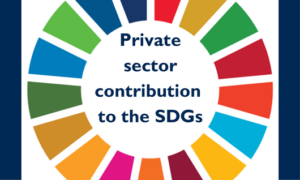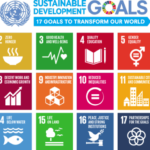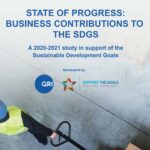
GRI is taking part in three events to strengthen the contribution of the private sector to the Sustainable Development Goals (SDGs), by helping make reporting on them more comparable, encouraging private sector engagement and supporting collaboration between business and academia to prepare the next generation of sustainability leaders.
Two years after the SDGs were adopted, more and more companies are reporting against the targets to show their contribution to these goals. In order to make reporting against the SDGs as valuable and impactful as possible, companies need to ensure their data is comparable and that future leaders are equipped to continue their work towards 2030 and beyond.
Making sustainability reports more comparable and useful in decision making is top of the agenda at the 34th session of the Intergovernmental Working Group of Experts on International Standards of Accounting and Reporting (ISAR), being held in Geneva, Switzerland on 1-3 November 2017. GRI’s Teresa Fogelberg is speaking at the event, sharing the work GRI is doing to promote and enable business reporting on the SDGs.
Comparability is one of the four Cs integral to the future of sustainability reporting, according to GRI Chief Executive Tim Mohin: to make reporting more concise, consistent, comparable and current. This is also the case for reporting on the SDGs, and GRI has been working to support this.
Business Reporting on the SDGs, an Action Platform run by GRI in partnership with the UN Global Compact, aims to leverage the GRI Standards and the Ten Principles of the UN Global Compact to help businesses incorporate SDG reporting into their existing processes.
GRI Deputy Chief Executive Teresa Fogelberg will be speaking about the Action Platform at the ISAR event, which is being hosted by the United Nations Conference on Trade and Development (UNCTAD). The main topics being discussed during Teresa’s session will be enhancing comparability of sustainability reporting, the role of disclosure in risk assessment and enhancing the usefulness of corporate reporting in decision making.
“In our work on the SDGs, we want to make reporting comparable, and a powerful tool for decision making,” commented Teresa. “We aim to enhance business reporting on the SDGs, to make it easier for businesses to understand, assess and report on those targets and to ensure those using the information will have access to the data they need and understand the contribution of business to the SDGs.”
In parallel to the SDGs Action Platform, UNCTAD and UN Environment are developing a project to identify a limited number of core indicators for corporate reporting on the SDGs. To promote alignment between the two initiatives, UNCTAD and UN Environment are advisors to the SDGs Action Platform, as members of the Multi-Stakeholder Advisory Committee (MAC). GRI and UNGC have incorporated the set of core indicators developed by UNCTAD and UN Environment into the indicator mapping of the Analysis of the SDG Goals and Targets.
“UNCTAD’s set of a limited number of core SDG indicators for companies is intended to provide a minimum common baseline for reporting on the private sector contribution to the implementation of 2030 Agenda for Sustainable Development,” commented Tatiana Krylova, Head, Enterprise Branch, UNCTAD. “We hope that, by convening key players in this area at ISAR, we can build momentum and facilitate a global dialogue and consensus on enhancing the role of enterprise reporting towards sustainable and inclusive growth.”
Educating tomorrow’s leaders
Collaboration between business and academia is also crucial for maximizing the impact of the private sector on the SDGs. At the 16th ABIS Annual Colloquium, being held in Brussels on 15-16 November, academic institutions, corporations, NGOs and others will come together to discuss the ways in which connecting business and academia can drive sustainable development.
Many academic institutions report their sustainability performance – more than 330 of the sustainability reports registered in the GRI Sustainability Disclosure Database were published by universities. Academic institutions are part of the MAC that advises the SDGs Action Platform, and academia is one of the constituencies represented in the development of the GRI Standards.
But the link goes much deeper: business-academic partnerships can contribute to achieving the SDGs, through knowledge transfer and support of research. And since the SDGs are long-term goals, tomorrow’s leaders will need to be prepared to build on the work businesses are doing to contribute – and measure that contribution.
“Academic institutions are already using the GRI Standards to report, and they’re also teaching this to their students,” said GRI’s Charlotte Portier, Senior Coordinator of the SDGs and Sustainable Development. “We want to focus on making sure the leaders of tomorrow are trained on the SDGs, and the GRI Standards are the perfect tool to support this effort.”
GRI also attended a workshop in Bahrain with 60 representatives from the private sector, government, academia, the UN and other stakeholders to promote private sector engagement with the SDGs. Led by the Ministry of Foreign Affairs and the Information and e-Government Authority (IGA), with support from the UN, the Bahrain government is working towards its Voluntary National Review on SDG Readiness – as part of the 2018 High-level Political Forum – and its first national SDG report. The workshop is part of a larger project, in which GRI will provide technical advice and best practices, promoting instruments such as the SDG compass.
Read more about how GRI is supporting business reporting on the SDGs here.



